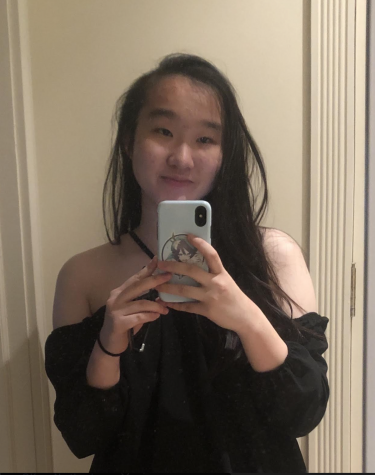A Nonbinary Perspective
December 7, 2020
During the holiday break of my freshman year, I came out to my friends as genderfluid. This means that my gender expression and identity will shift depending on my mood. The way I see it, I can feel like a girl, boy, enby (I’ll explain what this means later), nothing at all, or anything and everything at once. This is part of what it means to be nonbinary.
Depending on the person, nonbinary can be defined as a gender, existing between or outside of the gender binary (i.e. male and female). It can mean both, neither, all, or a preference of one gender over the other.

For the most part, nonbinary people will use they/them pronouns; some many be comfortable with also using she/her or he/him pronouns; and others may use neopronouns that exist even further outside of the gender binary (though, that’s a whole other discussion). Some may also identify themselves as transgender or gender nonconforming. A term many of them like to use is “enby,” which can be a substitute for man/boy or woman/girl—however, you should use the term with caution since some (although, very few) view the term as a generalization and find it offensive.
“For me, being nonbinary can be anything that doesn’t fit the socially constructed idea of gender,” my friend Arisu told me in a recent conversation. “You could identify as extremely feminine and still be nonbinary, and vice versa!” An enby’s gender expression (meaning the way they dress, act, etc.) totally depends on the person. Some like to remain gender neutral, some may express aspects of both, while others like to lean towards male or female.
Arisu is an internet friend of mine; they’re a 16 year old, half Japanese enby from Brazil. Being from Brazil, they grew up with very traditional parents. “I don’t really care [when people make rude comments regarding my gender], since they will never be as bad as my parents, [given the way that they are].” Having parents that don’t understand is an experience that a lot of enbys, and LGBT youth in general, can relate to.
While some enbys are open about their gender identities and expression, many are not. “I keep very down low about my gender, and I’m always wary before I reveal information,” says Mel, an internet friend of mine from Ireland.
Florin, another friend of mine, said, “I struggle with [my identity].” Accepting their gender identities can be extremely difficult for many enbys, especially when many of them are still unsure about who they are.
Many enbys can’t see the beauty or individuality in themselves. “Genuinely, there is nothing I can think of that is special or unique [about me]. I think I occupy the strange grayness of being painfully average, like I’m always on the cusp of greatness, and yet I always fall short,” continued Florin.
Struggling with self-love and confidence is also common for many enbys. “There’s a lot of dissonance between how I look and how I want to look, which tends to hurt my mental health and self esteem,” remarked South High junior Lizzie Sokolova.
And a large aspect of self esteem issues is due to their lives at home. “Growing up in a super conservative republican household, my parents introduced me to homophobia and transphobia at an early age,” Lizzie said. “It’s very hard growing up in a world that teaches you to hate yourself.”
One way for them to cope is through their sexualities. “I don’t think I’d be nonbinary if I wasn’t a lesbian, and I don’t think I’d be a lesbian if I wasn’t nonbinary,” Florin said. Then, they said something incredibly insightful. “I tend to think of my gender and sexuality not as two separate halves, but as one cohesive whole. I am not nonbinary and lesbian, I am a nonbinary lesbian…I experience gender explicitly through the lens of lesbianism, and I experience lesbianism through the lens of my nonbinaryness.”
Another thing that can help is having a support network: family and friends who are there to help through any situations of discrimination or invalidation. “I’ve been called a liar, a troll, and an attention seeker,” Arisu said. “It sucks that people can’t understand me and that they will generalize me like that.”
A support network can also help enbys by having people to just talk to and laugh with. “Both me and my younger sibling are nonbinary,” Arisu said. “When my sibling came out to me, we both said, ‘but I thought you were homophobic!’ and that was super funny to me.”
“I’ve met plenty of accepting and welcoming people, both online and in person, and being with them and being able to be the person who I always have to hide is really relaxing,” Arisu laughed. Besides being nonbinary, Arisu also identifies under several xenogenders (which are genders made for people’s interests or struggles) and says, “[it’s a] new definition of gender for people to better express themselves.” And that’s what I think being nonbinary is all about.
“Gender feels like a constricting box where I’m expected to act a certain way. For me personally, being nonbinary feels like I’ve escaped this box,” said Mel. Society’s expectations of us enbys can be and are hard to deal with. Lots of people don’t understand, or they’re ignorant of who we are. Often, we’re not considered an option. “Every time I play a game, for example, and it says choose male or female, I’ll just kind of be there like: huh?”
So, the best thing you can do is to understand that we do exist, and that we are valid. Don’t generalize us because we’re unique individuals. Don’t take us for granted, and know that we’re people too.





